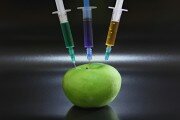Bisphenol A: How to Limit Your Exposure to Dangerous Toxins
A chemical found in baby bottles, CD cases, plastic knives, forks, and the lining of food and drink containers could be behind rising numbers in male infertility…
Bisphenol A or BPA (a synthetic oestrogen) is a chemical used to harden plastics and it is one of the world’s most widely manufactured chemicals, with more than 2.2 million tons made each year.
If you live in Europe or the US, it is highly probable that you have Bisphenol A in your system since 90 per cent of Europeans and Americans have detectable amounts.
Detrimental effects on fertility rates
In one of the first human studies, published in the journal Reproductive Toxicology, Professor Meeker and fellow researcher Russ Hauser, from the Harvard School of Public Health, recruited 190 men through a fertility clinic.
The study compared the levels of BPA in urine samples with the men’s sperm quality and concentration. It also looked for signs of DNA damage in their sperm.
The results showed that men with the highest levels of BPA in their bodies had sperm counts which were 23 per cent lower on average than men with the least exposure. The results also suggested a 10 per cent increase in sperm DNA damage.
These results add to already existing evidence from previous studies showing the harm exposure to Bisphenol A can inflict. For example it may have long term effects on the development of foetuses and affect female fertility. Studies conducted on mice and mice foetuses, showed that those who were exposed to BPA during their time in the womb, were more sensitive to oestrogen, which could render them infertile later in life…
BPA is believed to mimic the female sex hormone oestrogen and interferes with the way hormones are processed by the body, which is why it has been dubbed a “gender-bender”… Other studies have linked BPA to breast cancer, liver damage, obesity and diabetes.
Not so plastic fantastic
Still on the same note, but leaving Bisphenol A for a moment, here’s more disturbing news on plastic.
Ever heard of dioxin? Well, perhaps you haven’t but chances are you’ve ingested this toxin unknowingly on numerous occasions… through your plastic water bottle, ready-meal containers and microwave dinners…
The US Environmental Protection Agency (EPA) listed dioxin as a human carcinogen, and this widespread and persistent pollutant may contribute to the development of breast cancer.
I came across the following information in the John Hopkins Hospital newsletter. The same information has also been circulated at the Walter Reed Army Medical Centre, in the US.
“Cancer News from John Hopkins:
1. No plastic containers in microwave. 2. No water bottles in freezer. 3. No cling film in microwave.
Dioxin chemicals cause cancer, especially breast cancer.
Dioxins are highly poisonous to the cells of our bodies. Don’t freeze your plastic bottles with water in them as this releases dioxins from the plastic. Recently, Dr. Edward Fujimoto, Wellness Program Manager at Castle Hospital, was on a TV program to explain this health hazard. He talked about dioxins and how bad they are for us.
He said that we should not be heating our food in the microwave using plastic containers. This especially applies to foods that contain fat. He said that the combination of fat, high heat, and plastics releases dioxin into the food and ultimately into the cells of the body…”
Keeping abreast
US researchers at the University of Rochester Medical Centre, reported in the online journal Toxicological Sciences, that dioxins have a profound effect on breast tissue. It causes mammary cells to stop their natural cycle of proliferation as early as six days into pregnancy, and lasting through mid- pregnancy. This may explain why some women have trouble breastfeeding or don’t produce enough milk.
But wait, there’s more…
Another US study from Northern Illinois University and South Illinois University used dioxin data from Michigan Department of Environmental Quality soil samples and breast cancer data from the Michigan Department of Community Health to map breast cancer incidence in the area. The results showed that women who live in dioxin-contaminated areas have increased levels of breast cancer.
More anecdotal reports are coming to the fore too. Well-known singer song-writer Cheryl Crow (a breast cancer survivor) said in a US talk show, that her oncologist told her not to drink bottled water that has been left in a car, because the heat reacts with the chemicals in the plastic of the bottle which releases dioxin into the water.
Whilst little concrete information is available about the link between dioxin and breast cancer, it is clear that the medical mainstream is aware of this risk… hopefully they’ll start joining the dots soon…
What with dioxins, and the risk of Bisphenol A, I cannot help but wonder how much longer it will take before the “plastic gang” is banned completely. Denmark is the first EU country to ban the chemical in food and drink containers for children under three.
Canada and three US states have already brought bans in to effect.
Unfortunately, in the UK, the Food Standards Agency (FSA) insists that there is no evidence BPA is harmful… So an outright ban is not on the cards in the near future, leaving it down to us as concerned parents and grand-parents to spread the word and protect ourselves against the potentially damaging effects of these dangerous chemicals.
Take action
Start to protect you and your family today by using the following measures:
* If you have to use a microwave to heat or defrost food, do it using glass or ceramic containers.
* If you have microwave dinners occasionally, remove the food from its pre-packaged container before heating it. The same applies to soups and sauces.
* Don’t cover your food with cling film when you heat it. The high heat causes poisonous toxins from the cling film to contaminate the food. Use a glass or ceramic lid instead.
* During summer time, it is difficult to be out and about without a bottle of water. However, see to it that you finish the water in the bottle, don’t re-cool it once it has reached room temperature and discard the plastic bottle once it is empty. Don’t drink the water if the plastic bottle has been out in the sun or in a spot where it could heat-up.
* Opt for bottled water and other plastics with the recycling labels #1,#2 and #4 on the bottom and avoid those with PC or #7.
* Alternatively, you can look for BPA-free re-usable water bottles to carry your water around in. There is also a range of BPA-free baby products available.
* Eat fresh foods as much as possible and avoid canned foods (especially pasta, meats and soups).
* Avoid drinking canned fizzy drinks, beers.
* Wash plastics by hand or on the top shelf of your dishwasher
Here are some BPA-free brands, keep in mind that any product that is Bisphenol A-free will boldly highlight it:
* Nalgene Outdoor Products (water bottles)
* Green to Grow (baby bottles)
* Eden canned beans (only the beans)
* Rubbermaid containers
* Oral B toothbrushes
* Lego, Duplo toy blocks (made in Europe and US only)
Did you find this information useful?
Then why not get more expert health recommendations just like this delivered direct to your inbox?
"It is truly refreshing to read a newsletter on the topic of alternative medicine which is scientifically based and reviewed by professionals..." - Robert Sinott
We respect your privacy and will never share your details with anyone else.Disclaimer: Bear in mind the material contained in this article is provided for information purposes only. We are not addressing anyone’s personal situation. Please consult with your own physician before acting on any recommendations contained herein.
Sources:
Study links dioxin to breast cancer around Midland, by Eartha Jane Melzer, published online 21.10.08
Dioxins In Food Chain Linked To Breastfeeding Ills, published online 14.06.2009, sciencedaily.com
CANCER UPDATE FROM JOHN HOPKINS HOSPITAL, published online, community.breastcancer.org
The rise in male infertility has been linked to a chemical commonly used in food and drinks containers, published online 05.08.10, uk2u.co.uk
Infertility causes due to BPA, published online, myfertileground.com
‘Gender bending’ chemical in food tins may cut male fertility, published online 05.08.10, dailymail.co.uk
- Comments (1)
- Facebook Comments (0)
Comments are closed.











Well it looks as if the best way to stay healthy is to stay out in nature and not come close to anything that is man-made…